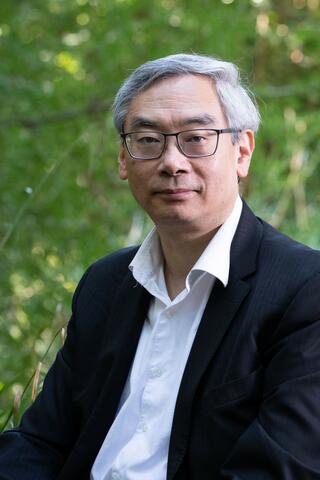
Jian-Sheng Sun
Co-leader of the SOUND project's "Global Approach to Health" thematic program
The SOUND program has an essential role to play in bringing scientific knowledge to society, citizens, decision-makers and socio-economic players.
Professor at the Muséum National d'Histoire Naturelle (MNHN), where he heads the Living Adaptations Scientific Department, Jian-Sheng Sun discusses the objectives and challenges of the "Global approach to health" thematic program he co-directs with Alexandre Escargueil as part of the SOUND project.
Tell us a little about your career and your current position.
Jian-Sheng Sun: As a biophysicist and professor at MNHN, I've had a dual public/private career. My academic research focuses on the structures and functions of nucleic acids. In 2006, I co-founded and managed the biotech company DNA Therapeutics to develop an anti-cancer drug candidate based on the results of fundamental research, the mechanism of action of which had never been tested in humans. After ten years on secondment in the pharmaceutical industry, I returned to the MNHN, where I have headed the "Adaptations du vivant" scientific department since 2017. I work closely with my colleagues in charge of the "Origin and Evolution" and "Man and the Environment" departments to lead cross-disciplinary activities within the Museum: research, collections, teaching and training, expertise and dissemination.
In addition to these functions, I also represent MNHN on the board of directors of the OneHealth major field of interest (Dim), which aims to develop the integrative health concept based on the interdependence of human, animal and environmental health in the field of infectiology. I am also a member of the supervisory committee for the priority research program on antibiotic resistance and the PREZODE research program. The latter aims to understand the risk factors associated with the emergence of zoonoses and the underlying ecological and epidemiological mechanisms, with the ultimate aim of proposing management strategies for socio-ecosystems resilient to these emergences, as well as surveillance and early detection systems.
Could you tell us what you see as the objectives and challenges of the SOUND project?
J.-S.S.: Humanity is faced on the one hand with planetary limits, linked to resources of all kinds, and on the other with social inequalities and injustice. We must therefore face up to these two interdependent challenges. Health is one of these challenges. And our role as scientists is to alert society, citizens, but also decision-makers and industrialists to these issues, so as to change the trajectory we're on and bring it back into a sustainable zone.
In this respect, I believe the SOUND program has an essential role to play: that of making scientific knowledge available to society, citizens, decision-makers and socio-economic players.
Why did you decide to pilot a thematic program?
J.-S. S.: Because of our functions, we at MNHN are already very aware of the need to disseminate our scientific knowledge to the general public, to socio-economic players and also to our decision-makers, notably through our institutional expertise mission.
As I'm already involved in this kind of action, I wanted to get more involved in the SOUND program over the long term, with my colleague Alexandre Escargueil, by continuing to develop the theme of integrative health according to the One Health concept beyond the borders of the MNHN.
What will be your role as pilot?
J.-S.S.: With Alexandre Escargueil, we want to create links between SOUND's three thematic programs. We have therefore proposed a number of cross-cutting themes, such as food, which addresses issues of planetary resources and disease prevention (diabetes, obesity, etc.), as well as the human and social sciences, since this is an eminently cultural and behavioral subject.
The other area we wish to develop is that of the exposome, i.e. all the physical, chemical and biological exposures that affect the health of living organisms: greenhouse gases, pesticides, etc. Once again, this theme is in line with other areas of research. Here again, this theme ties in with SOUND's other thematic programs, since such pollution stems in particular from the inappropriate exploitation of resources, and calls into question the way in which human society uses them.
We are also looking at other approaches, such as mental health.
How do you plan to work with institutes and initiatives?
J.-S.S.: We have identified three levels of approach within the community. In faculties, research is often disciplinary. At institute and initiative level, it is interdisciplinary and thematic. The SOUND project brings an additional aspect, with a multi-disciplinary, thematic and socially-oriented vision.
We're going to start by identifying what is already being done in faculties, institutes and initiatives around integrative health, so as to have a structuring effect on the SOUND project. We'll be looking at how to promote and disseminate to society the fundamental research being carried out on this subject within faculties, institutes and initiatives, in order to amplify it and give it greater visibility.
